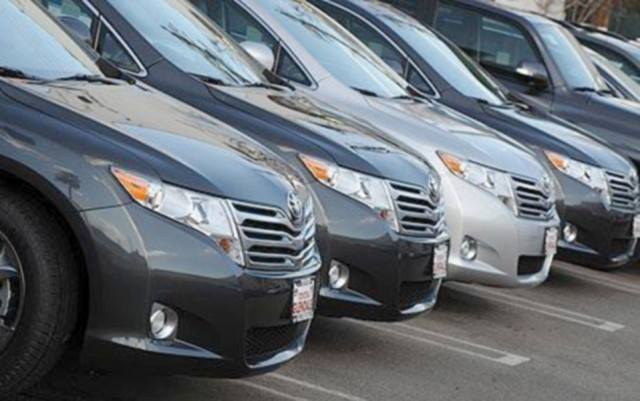Auto industry mulls trade with India
Step by step approach advocated.

Ahmed, citing high imports of used cars, said the auto industry is less protected than its competitors. PHOTO: FILE
Though the automobile industry has been a protected sector in Pakistan, it debates the abolition of the negative list and the tiny sensitive list in trade with India.
In an interview with The Express Tribune, House of Habib Vice Chairman Automotive Sohail P Ahmed explained why the auto industry is not against trade with India and how it wants the government to ease restrictions steadily.
Ahmed said that it is possible for the automobile industry to grow at home while gradually moving ahead in trade with India step by step. “Auto industry requests the government to chalk out a long-term plan that can increase manufacturing of automobiles and their parts in the country,” he added.
According to a recent report by the Pakistan Business Council (PBC) – a business policy advocacy forum – Pakistan’s automotive industry is protected under the negative and sensitive lists with many items overlapping in the two lists. Moreover, the automobile sector would most likely enjoy protection even after the abolition of the negative list (a list of 1209 items in which Pakistan does not allow trade with India).
There is a list of 122 items (HS codes) related to the auto industry. The same PBC study identifies 25 such items that holds a potential of $1 billion imports (Pakistan already imports such items from different countries) and out of these, 23 are protected by Pakistan under the negative and sensitive lists fearing tough competition with India. The report explains that India is a cheaper alternative for such parts, if not complete units, instead of the country’s current source of import such as Thailand and Japan.
The government of Pakistan is looking to give Non Discriminatory Market Access (NDMA) that will technically abolish the negative list. In return, it desires India to remove all non-tariff barriers (NTBs) that it feels are hampering Pakistani exports. However, since the South Asian Free Trade Agreement (SAFTA) allows its signatories to maintain the sensitive list, both India (614 items – reduced by 30% in 2011) and Pakistan (936 items – reduced by 19% in 2011) will continue to maintain their sensitive lists.
Later in September 2012, both countries promised to give further concessions: India agreed to cut its sensitive list to just 100 items and Pakistan to give it NDMA status and open the Wagah-Attari border for all items.
Unlike Pakistan, India does not maintain any negative list for Pakistan. But since it has strong and complex tariff and para-tariff protections for its local industry, a large number of Pakistani exporters find it difficult to export to India.
Ahmed’s unease seems more with-shortening of the sensitive list than granting NDMA status to India. “Pakistan can bring down the sensitive list to 350-400 items from the current 936 items but not to 100 items as it will badly hurt its auto industry,” he said.
Replying to a question on the protection of the local auto industry, he said that like most countries, the auto industry may be protected more in Pakistan compared to other industries but it is surely less protected (citing high imports of used cars in Pakistan) than its competitors.
“But one thing is clear, if you want to promote manufacturing in the country then you must protect your local industry.” said Ahmed. Citing examples of India, Malaysia and Thailand, he said automobile producing countries protect their auto industries because this industry creates larger number of jobs especially in auto part manufacturing.
While agreeing with auto analysts, Ahmed said that compared to automakers, auto parts makers are more likely to get a hit if Pakistan starts importing auto part from India.
Since volumes of Pakistan’s auto parts makers are extremely low compared to their Indian counterparts, their cost of production is significantly higher which is why many of them may shutdown in case of an open trade with India, he maintained.
With all the reservations, Ahmed is convinced that joint ventures and technology transfers from Indian automakers is the best business model that can work for both Indian and Pakistani automakers. “I am in all favour of joint ventures and technology transfer with Indian auto companies. If that happens, it will converge the interests of Indian and Pakistani auto industries bringing down cost of production and also create more job opportunities,” he said.
Published in The Express Tribune, May 5th, 2014.
Like Business on Facebook, follow @TribuneBiz on Twitter to stay informed and join in the conversation.



















COMMENTS
Comments are moderated and generally will be posted if they are on-topic and not abusive.
For more information, please see our Comments FAQ